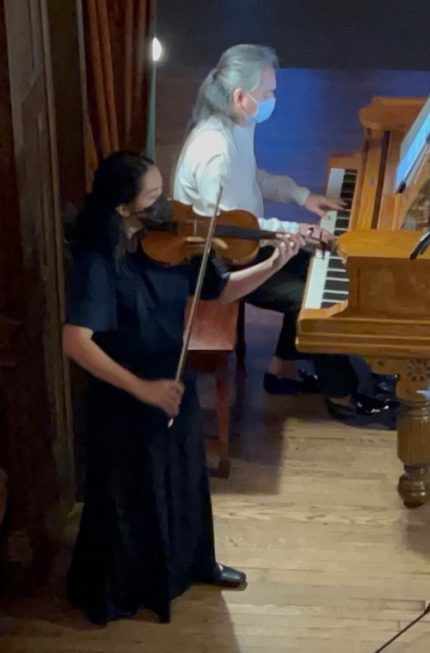Artistic grace under pressure exquisitely displayed at Evanston Chamber Music Festival

More than two years since the inception of the Covid-19 pandemic, it’s hard to be surprised by any derailment in plans on account of the disease.
Such was the case again Friday night when an eleventh-hour Covid diagnosis left two singers unable to perform on the opening program of the Evanston Chamber Music Society’s Summer Music Festival, presented by the FilAm Music Foundation.
What was surprising was the remarkable level of poise and assured musicality that FilAm artistic director Victor Asunción and his colleagues brought to an entirely retooled program at the Charles Gates Dawes House in Evanston.
Out went selections for clarinet and soprano by Khachaturian, Richard Strauss, Debussy, Puccini, Verdi, and Offenbach; in came standard repertoire centered on the impromptu theme of “Brahms and the Schumanns.” Yet if the ensuing program was culled from back-pocket rep, the first-rate performances by all musicians involved left some of the audience none the wiser.
The intimate quarters and muted lighting of the Dawes House’s great hall proved a fitting backdrop for Robert Schumann’s stormy Violin Sonata No. 1. Simmering and rhythmically taut from the first note, pianist Asunción and violinist Marian Mayuga tumbled through the rollicking “Mit Leidenschaftlichem Ausdruck” with like-mindedness and absolute fervor.
A well chosen tempo in the third movement, “Lebhaft,” proved the key to a grooving, thrilling finish. The most entrancing moment comes toward the end of the movement when the piano intones a quasi-Gregorian chorale while the violin unspools a sustained melody overtop. In Asunción’s hands, this figure took on a distant quality, as if heard offstage, then morphed into a constellation of delicate harp-like bass notes before crescendoing toward a brilliant finale.
Mayuga and Asunción are an exquisite pair who share a remarkable ability of being able to extract myriad sonorities from their instruments and modulate between them with hairpin agility. Nowhere was this clearer than in the bristling opening melodies of Brahms’ Sonatensatz in C minor. A more brazen statement than Schumann’s sonata, this scherzo is ripe with youthful impetuousness and wide-eyed fervor. Taking that cue, Asunción and Mayuga imbued the agitated themes and soaring heroic melodies with the appropriate level of melodrama.
Asunción’s playing was similarly mellifluous in a pair of solo piano selections, each written in tribute to Clara Wieck Schumann. Liszt’s transcription of “Widmung” (“Dedication”) from Robert Schumann’s song-cycle Myrthen illuminated the pianist’s uncanny powers of evocation. Each layer of the composition was imbued with its own timbral quality, from the penetrating lyricism of the vocal melody to the tender, music-box quotation of Schubert’s “Ave Maria” toward the piece’s end.
If “Widmung” suggested a bold profession of love, orchestral in its scope and color, the second Intermezzo from Brahms’ 6 Klavierstücke, Op. 118, found a more plainspoken and rhapsodic vein. Asunción was particularly magnificent in the mature, romantic theme that emerges in the piece’s middle section, which he lent a fitting gravitas between statements of the childlike main theme.
To close the program, Asunción was joined on stage by clarinetist Carla Fortmann—who was also slated to perform on the original program—and cellist Ezra Escobar for Brahms’ Clarinet Trio in A minor, Op. 114.
The combination of clarinet, cello, and piano is an uncommon chamber configuration and yielded its share of challenges for the evening’s performers. Fortmann, perhaps wrestling with a fussy reed, sounded stuffy in the opening movement, and often struggled to balance the comparably confident Escobar. While each player was technically sound, the two instrumentalists at the fore combatted intonation discrepancies throughout the performance.
Those issues seemed to evaporate almost instantly from the start of the fourth movement. Fortmann’s buoyant clarinet tone, which grew warmer and clearer as the piece progressed, coalesced seamlessly with Escobar’s throaty cello, and all three players, united by Asunción’s fleet-fingered pianism, locked in to the sonata’s springy rhythm.
Coming in just shy of 80 minutes, the amended program, performed without intermission, left one feeling refreshed and invigorated at such a heartening demonstration of exemplary professionalism and artistry, especially in light of the circumstances. The show must go on, and those in attendance Friday evening in Evanston should feel lucky it did.
The Evanston Chamber Music Society’s Summer Music Festival continues Saturday (with an alternate program) and Sunday with performances at the Charles Gates Dawes House in Evanston. www.filammusic.foundation
Posted in Performances

